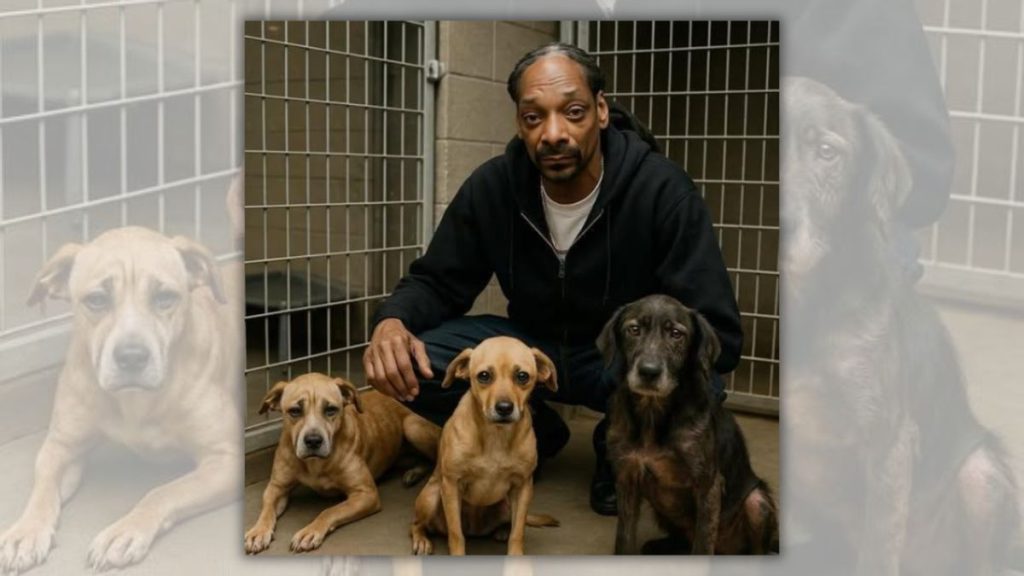Listen to the article
In late October 2025, social media buzzed with a heartwarming tale claiming rapper Snoop Dogg had rescued 39 dogs from euthanasia at a struggling New York shelter. According to the viral story, the music icon quietly visited the facility, paid off its debts, and even adopted an elderly Labrador retriever named Buddy. Despite its widespread circulation and emotional appeal, fact-checkers have confirmed the story is entirely fabricated.
The false narrative spread rapidly across multiple platforms including Facebook, Instagram, Threads, and YouTube. One widely shared post described how the 48-year-old rapper supposedly visited a shelter “on the brink of closing” and, after meeting an 11-year-old Lab mix, declared that “all 39 dogs deserve a tomorrow.” The posts typically featured what appeared to be an image of Snoop Dogg crouching beside three dogs.
Comprehensive searches through multiple search engines found no legitimate news coverage of such an event. Had a celebrity of Snoop Dogg’s stature performed such a notable act of charity, it would have generated substantial media attention from established news outlets.
Digital forensics experts examined both the text and images associated with the false story. The lengthy, emotional narrative displayed several hallmarks of artificially generated content. Text analysis tools like ZeroGPT indicated the writing was likely AI-generated, noting its formulaic structure, overly sentimental language, and lack of verifiable sources or specific details that would appear in genuine reporting.
The image accompanying the posts also failed authenticity tests. AI detection tools including Sightengine and Hive Moderation identified multiple visual inconsistencies typical of synthetic media: unnatural lighting and shadow patterns, slightly distorted facial features, and artificial textures in both Snoop Dogg’s skin and the dogs’ fur.
This fabricated story exemplifies what digital literacy experts call “glurge” – emotionally manipulative, often false narratives designed to evoke strong feelings. These stories have become increasingly common in the social media ecosystem, where they serve as bait to drive traffic to advertisement-laden websites.
The Facebook posts spreading the false claim typically linked to external websites filled with advertisements. The linked articles expanded on the fictional rescue with even more detailed, AI-generated narratives but provided no substantiation, sources, or factual context that would appear in legitimate reporting.
This isn’t the first time Snoop Dogg has been the subject of misinformation. Fact-checkers have previously debunked claims that he was denied access to a first-class airline seat due to racial discrimination, as well as false stories that he terminated a contract with Country Music Television in support of singer Jason Aldean.
The proliferation of such fabricated celebrity stories highlights growing challenges in the digital information landscape. As AI-generation tools become more sophisticated and widely available, distinguishing between authentic and manufactured content becomes increasingly difficult for average social media users.
Digital literacy experts recommend several strategies for identifying potentially false stories: checking whether mainstream news organizations have covered the event, looking for specific details like dates and named sources, examining image inconsistencies, and being particularly skeptical of emotionally charged stories that seem designed primarily to generate shares rather than inform.
While Snoop Dogg has been involved in various charitable endeavors throughout his career, this particular dog rescue story belongs firmly in the category of digital fiction rather than factual reporting.
Fact Checker
Verify the accuracy of this article using The Disinformation Commission analysis and real-time sources.




12 Comments
While the idea of Snoop Dogg rescuing a shelter full of dogs is heartwarming, it’s important to always fact-check these types of claims before sharing. Viral stories aren’t always accurate, even if they’re compelling.
Well said. It’s a shame when uplifting stories turn out to be fabricated, but it’s better to have the truth than to spread misinformation, even inadvertently. Responsible reporting is key.
It’s unfortunate when feel-good stories like this prove to be untrue. While the premise was heartwarming, the lack of legitimate news coverage is telling. Fact-checking is crucial to maintaining trust in reporting.
You’re right. As much as we’d like to believe these kinds of uplifting stories, it’s important to ensure they are accurate before spreading them further. Responsible reporting helps avoid the spread of misinformation.
Interesting, but it’s good to verify celebrity stories before sharing. Fact-checking is important, especially with viral social media claims that may not hold up under scrutiny.
Agreed. Misleading stories, even if well-intentioned, can spread quickly online. It’s wise to be cautious and wait for credible news sources to report on such matters.
Hmm, I’m not surprised this turned out to be fabricated. Celebrity charity claims often go unchecked and end up being exaggerated or completely false. Good on the fact-checkers for debunking this one.
That’s a fair point. Viral stories about famous figures doing good deeds should be scrutinized, as they may not always reflect the full truth. Verification is key.
Hmm, I’m not surprised this turned out to be a fabrication. Celebrities often get unfairly credited with charitable acts they didn’t actually do. Good on the fact-checkers for setting the record straight.
Exactly. It’s easy for feel-good stories to gain traction online, but without verifiable evidence, they can quickly become urban legends. Proper investigation is crucial to maintaining credibility.
It’s disappointing to see this feel-good story debunked, but it’s a good reminder that we should always verify viral claims, especially those involving celebrities and their charitable acts. Fact-checking is crucial.
Absolutely. Sensational stories tend to spread quickly, but that doesn’t mean they’re accurate. Taking the time to properly investigate the facts is important, even for uplifting narratives.